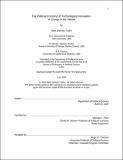The political economy of technological innovation : a change in the debate
Author(s)
Taylor, Mark Zachary
DownloadFull printable version (446.6Kb)
Alternative title
political economy of technological change : a change in the debate
Other Contributors
Massachusetts Institute of Technology. Dept. of Political Science.
Advisor
Michael J. Piore.
Terms of use
Metadata
Show full item recordAbstract
Why are some countries more technologically innovative than others? The dominant explanation amongst political-economists is that domestic institutions determine national innovation rates. However, after decades of research, the empirical evidence for this relationship remains equivocal. There are simply many countries with "good" institutions that do not innovate at the technological frontier, and many countries with "bad" institutions that have nonetheless built impressive records of technological progress. Therefore, in this dissertation, in order to probe the sources of variance in national innovation rates, I analyze quantitative data on innovation, various domestic institutions, and four types of international relationships. First, I review the National Innovation Systems literature. Second, I test the Varieties of Capitalism theory of innovation. Third, I ask whether decentralized states are better at technological innovation than centralized states. In each case, I find that there exists little empirical evidence for an aggregate relationship between domestic institutions and technological innovation. That is, although a specific domestic institution or policy might appear to explain a particular instance of innovation, they fail to explain national innovation rates across time and space. (cont.) However, the empirical evidence does suggest that a country's international relationships may be the missing piece to the national innovation rate puzzle. More specifically, the evidence presented in this dissertation suggests that certain kinds of international relationships (e.g. capital goods imports, foreign direct investment, educational exchanges) do affect national innovation rates in the aggregate. And countries which have these kinds of relationships with the lead innovating nations tend to become more innovative than states which do not, almost regardless of their domestic institutions. In other words, explaining national innovation rates may not be so much a domestic institutions story as it is an international story. My empirical evidence includes data on simple patent counts, patents weighted by forward citations, science and engineering publications (both simple counts and citations-weighted), and high-technology exports.
Description
Thesis (Ph. D.)--Massachusetts Institute of Technology, Dept. of Political Science, 2006. This electronic version was submitted by the student author. The certified thesis is available in the Institute Archives and Special Collections. Includes bibliographical references (p. 75-82).
Date issued
2006Department
Massachusetts Institute of Technology. Department of Political SciencePublisher
Massachusetts Institute of Technology
Keywords
Political Science.
